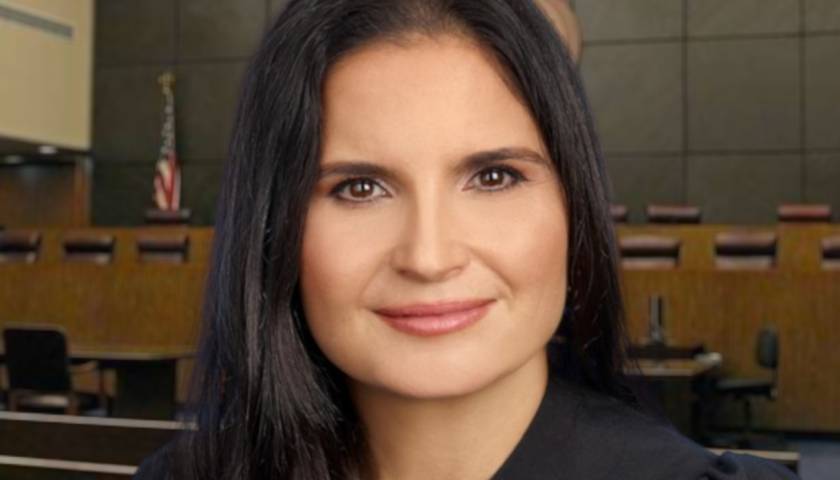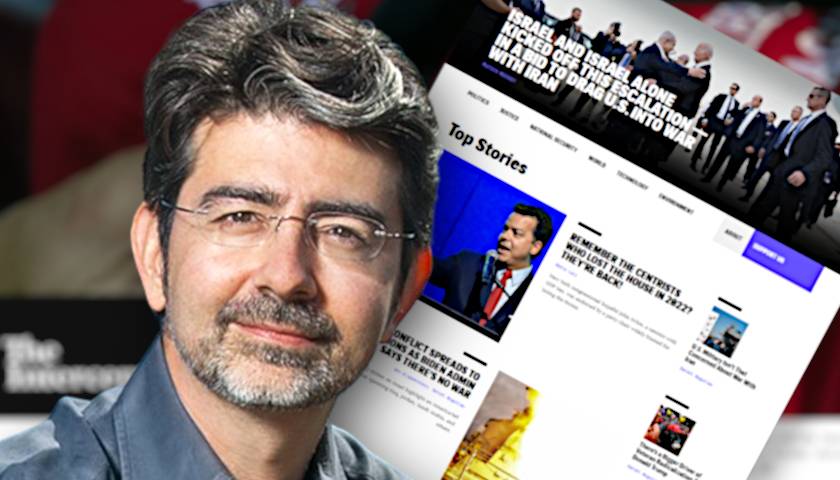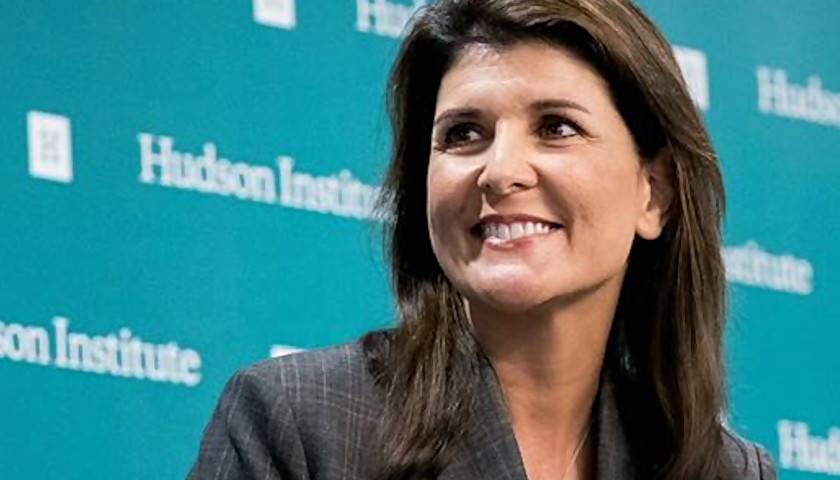by Julie Kelly
The residents of Fort Pierce, Florida, are not accustomed to seeing dark SUVs and flashing motorcycles speed down the town’s main thoroughfare bordering the shore of the Atlantic Ocean. Part beach getaway, part working class community, the city is located about 60 miles north of the luxurious Palm Beach estate of the most famous – and frequent –criminal defendant in recent history: Donald J. Trump.
The former president has become a regular visitor to the federal courthouse in Fort Pierce, more specifically, the courtroom of U.S. District Court Judge Aileen Cannon who is presiding over the so-called classified documents trial.
When Special Counsel Jack Smith filed a sprawling indictment against Trump that included 32 counts of violating the Espionage Act for allegedly taking national defense records when he left office, he not only put the 43-year-old judge in the spotlight – he also put her in the crosshairs.
Since being assigned the case in June 2023, Cannon has been widely attacked by Trump’s critics, who demand that she recuse herself from the case for a variety of reasons including a perceived conflict, based on the fact she was appointed by Trump in 2020 and on her inexperience on the bench.
A few days after Cannon received the case, Barbara McQuade, an Obama-appointed assistant U.S. attorney and cable news legal analyst, told the Washington Post, “Judge Cannon could delay the case at the request of Trump, either to provide time to adequately prepare for trial or to avoid interfering with his presidential campaign. She really has the ability to wreak havoc.”
That same week, Obama’s Attorney General, Eric Holder, told MSNBC, “I don’t have confidence in her abilities to be fair or to be seen as fair.”
Michael Bromowich, one of the lawyers who represented Brett Kavanaugh accuser Christine Blasey Ford, tweeted that Cannon was not “experienced, smart, [or] impartial” enough to handle the history-making case. “If she has any self-awareness, she should recuse herself.”
Since then, the drumbeat for her recusal has intensified. Like another Trump appointee, U.S. District Judge Maryellen Noreika, who rejected the sweetheart plea deal prosecutors offered Hunter Biden in Delaware, Cannon has rankled critics by expressing a strong skepticism of the Department of Justice, which has been tarnished by the Russiagate collusion hoax and other scandals.
The demands for Cannon’s removal find echoes on the other side of the political spectrum from Trump’s lawyers. They argued that Judge Tanya S. Chutkan, who is handling Smith’s other case against Trump in Washington, D.C., should recuse herself for repeatedly expressing anti-Trump bias while presiding over Jan. 6 Capitol protest cases. Chutkan denied that motion last year. (With rare exceptions, judges ultimately decide for themselves whether to step down from a case.)
The attacks on Cannon and other judges reflect how partisanship increasingly colors the understanding of the rule of law. Court watchers say that politics has always influenced America’s courts, but the nation’s growing political divide, in which different people seem to embrace different sets of truths, has many people finding nefarious motives in rulings they do not like.
Since being assigned the case, Cannon has issued a series of decisions unfavorable to the Department of Justice. During a March 14 hearing, she pointedly forced the government to admit that no former president or vice president has ever been prosecuted under the Espionage Act. In so doing, the judge hinted at what many perceive to be a double standard toward Trump days after Special Counsel Robert Hur testified before Congress on why he did not bring similar charges against President Biden, Trump’s political foe.
Judge Cannon has chastised Smith’s team for making unnecessary redactions to court documents; for failing to produce discovery material to the defense on time; and for not creating a secure facility for the defense to review sensitive files. She has also accused the prosecution of abusing the grand jury process by conducting nearly all of its investigation in DOJ-friendly D.C. rather than southern Florida, the more logical jurisdiction, and for attempting to remove one of the defense attorneys in the case for an alleged conflict of interest.
She recently asked both parties for draft versions of jury instructions that appeared to favor Trump’s argument that he was entitled under the Presidential Records Act to designate certain files as “personal.” Although her order on jury instructions came early in the process, it appears Cannon is attempting to flesh out the government’s case given the nebulous language in the Espionage Act and untested nature of the Public Records Act.
The order prompted more heated calls for her recusal.
Contrary to what her critics claim, Cannon has issued some pretrial rulings that went against Trump and his co-defendants. She quickly dismissed Trump’s argument that the vagueness of the Espionage Act warranted a dismissal of the case. She also suggested that she is inclined to deny another pending motion to dismiss based on protections of the Presidential Records Act.
Nevertheless, outspoken Trump critic George Conway declared last month on Twitter, “Okay, I’ve seen enough. Not only should Aileen Cannon not be sitting on this case, but she should not be sitting on the federal bench at all. This is utterly nuts.”
Trump’s critics seem especially concerned that unlike Chutkan – who has rushed proceedings in Washington, where she set a rare seven-month timetable between indictment and trial – Cannon might delay the trial past the fall election. She is preparing to announce a new trial date; her original date of May 20 was rendered unworkable given conflicts presented by Trump’s other criminal trials. She recently informed prosecutors that the government’s request for a July trial was “unrealistic” considering Trump’s other court obligations in New York, Georgia, and Washington.
Those who question Cannon’s legal acumen and fairness point to a ruling she made almost a year before Smith’s indictment.
Following the FBI’s armed raid of Mar-a-Lago in August 2022, Trump immediately filed a lawsuit seeking a so-called “special master” to replace government investigators in reviewing the roughly 13,000 pieces of evidence seized by the FBI, a move the DOJ opposed.
Cannon received the case. Citing numerous factors including the mishandling of privileged and personal records during the initial stage of the government’s investigation, Cannon granted Trump’s request. “[The] Court takes into account the undeniably unprecedented nature of the search of a former President’s residence; [Trump’s] inability to examine the seized materials to date; the power imbalance between the parties; the importance of maintaining institutional trust; and the interest in ensuring the integrity of an orderly process amidst swirling allegations of bias and media leaks,” Cannon wrote in her September 5, 2022, order.
Noting how information related to the raid was appearing in the media, Cannon also warned the government about “irreparable harm” to Trump if investigators continued to leak details to reporters, something Cannon forced one of the lead prosecutors to admit during a hearing on the lawsuit.
A special master – retired judge Raymond Dearie – subsequently was appointed. But in December 2022, a three-judge panel of the 11th U.S. Circuit Court of Appeals in Atlanta vacated her order and instructed Cannon to dismiss Trump’s lawsuit. The appellate judges also rebuked Cannon for going beyond her court’s jurisdiction.
Critics point to the decision by the appellate panel as proof of Cannon’s incompetence and bias.
The public onslaught comes with serious threats to Cannon’s safety; last November, 50-year-old Tiffani Shea Gish pleaded guilty to making death threats against Cannon. In one voice mail, Gish warned that she “already ordered snipers and a bomb to your f______ house.” In another she said, “Donald Trump has been disqualified long ago, and he’s marked for assassination. You’re helping him, ma’am.” Gish was sentenced to three years in prison.
(In August, another middle-aged Texas woman was arrested for leaving voicemails threatening Judge Chutkan. Abigail Jo Shry, 43, is charged with leaving voicemail messages on the phone in Chutkan chambers vowing to “kill anyone who went after former President Trump.” The threats, also with racist invective, continued, “You are in our sights, we want to kill you … you will be targeted personally, publicly, your family, all of it.”)
But all the external noise does not appear to have any effect on Cannon’s conduct in court.
Often arriving wearing glasses and her hair pulled back with no noticeable trace of makeup, Cannon seems unfazed by the presence of both the former president and special counsel seated on opposite sides of her courtroom directly in front of her. She often speaks in a low monotone voice, taking her time to read files and notes contained in a three-ring binder she carries into court before posing questions to prosecutors and defense counsel.
Her temperament in the historic case, according to a 2023 profile in the New York Times, does not surprise those closest to her. New York Times political writer Robert Draper interviewed friends and former colleagues who portrayed Cannon as a “diligent conservative achiever who seemed destined for success but perhaps ill-equipped for the notoriety that has now overtaken her.”
Born in Colombia in 1981 to a mother who had fled communist Cuba as a child, Cannon excelled at private high school in Miami, undergraduate school at Duke University, and University of Michigan law school where she graduated magna cum laude. She went on to pass the California, Washington, D.C., and Florida bar exams. Cannon kept her maiden name after marrying Florida restaurateur Josh Lorence in 2008. They have two children.
Despite spending seven years in the U.S. attorney’s office in southern Florida, Cannon, unlike most former federal prosecutors, expresses a heavy dose of skepticism toward the government – an approach some observers attribute to her family history escaping Communism.
“Several in the Florida legal community who know Judge Cannon have taken exception to assertions that she is a dunce, a Trump stealth warrior or both,” Draper wrote. Former high school classmate Alejandro Miyar, a partner in a Miami law firm specializing in corporate litigation, told Draper that Cannon is far from an attention-seeker. “I can’t think of any world in which she would want to make this case about her,” Miyar said.
Much of media, however, has different plans as Cannon deliberates crucial defense motions that could determine the outcome of the trial – or the basis for her to dismiss the indictment, or most of it, altogether.
Trump’s attorneys, Todd Blanche and Christopher Kise, in January filed a motion asking Cannon to consider several entities, including the Biden White House, as part of the prosecution team, which would require those parties to produce discovery material in the case. “New evidence … reveals that politically motivated operatives in the Biden Administration and the National Archives and Records Administration began this crusade against President Trump in 2021,” the pair wrote in a 68-page motion to compel release of the evidence. “These revelations are disturbing but not surprising.”
Biden’s White House general counsel, the National Archives, the intelligence community, the Secret Service, and the counterintelligence division of the FBI were named as participants in the defense’s overall investigation. Defense counsel also identified coordination between the White House and Fulton County District Attorney Fani Willis, who charged Trump and several others in a broad RICO indictment last summer.
Trump’s lawyers further asked Cannon to permit the unsealing of large swaths of evidence including the names of potential witnesses – a request the DOJ vehemently opposed but Cannon signaled she would allow.
“The parties are reminded of the strong presumption of public access in criminal proceedings,” Cannon wrote in a Feb. 9 order peppered with criticism of the special counsel’s attempts at secrecy. “Although substantiated witness safety and intimidation concerns can form a valid basis for overriding the strong presumption in favor of public access, the Special Counsel’s sparse and undifferentiated response fails to provide the Court with the necessary factual basis to justify sealing.”
She placed her order on temporary hold pending more motions and perhaps an evidentiary hearing. But if she moves forward, explosive revelations about how top federal agencies conspired to take down Donald Trump could be made public and contradict claims that the DOJ worked “independently” of the White House.
Cannon also continues to consider the defense’s motion in February to dismiss the case as a selective and vindictive prosecution. The motion was seemingly bolstered by the report issued by Special Counsel Robert Hur in his investigation into Biden’s retention of classified records including national defense papers. Hur declined to prosecute Biden for keeping the materials at numerous locations at his homes, Penn Biden Center in Washington, and University of Delaware, the repository of his Senate records.
During a March 14 hearing in Fort Pierce, Cannon and the defense repeatedly raised the question of “arbitrary enforcement” of the Espionage Act. “[It] is uncontested, of course, that no former executive or former vice president had ever been – had ever been – been faced with or exposed to criminal liability for retaining personal or presidential records,” Cannon said to Jay Bratt, one of Smith’s lead prosecutors.
“None has been charged,” Bratt affirmed.
Cannon wondered aloud about Trump’s thinking and how he could have expected the same treatment. Cannon asked Bratt if it was “reasonably foreseeable” for Trump to expect to avoid prosecution given the statute’s history and his purview as the “original classification authority” over presidential papers.
Bratt further clarified that the alleged crime took place the moment Trump left office, prompting Cannon to again suggest different treatment between Trump and Biden. “[Then] wouldn’t that have been applicable to other officials who, I think, it’s undisputed have possessed classified information post-presidency, and done so through willful actions?”
It’s unclear when Cannon will issue a decision on the outstanding motions.
– – –
Julie Kelly is a reporter at RealClearWire.
Photo “Judge Aileen Cannon” Southern District of Florida (public domain); background photo “courtroom” by Carol M. Highsmith Archive, Library of Congress






